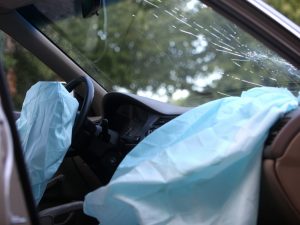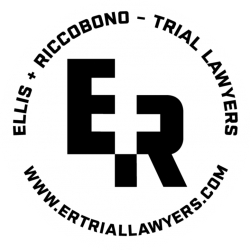TRUSTED PRODUCTS LIABILITY ATTORNEYS

Every year in the United States, defective products cause severe injuries to thousands, impacting lives and livelihoods irreversibly. Ellis Riccobono, LLP understands the gravity of these incidents and are committed to holding manufacturers accountable. Our trusted product liability attorneys leverage extensive legal expertise to ensure that victims of defective products—from malfunctioning medical devices to unsafe automotive parts—receive the justice and compensation they deserve.
If you or a loved one has suffered because of a defective product, you are not alone. We are here to help navigate the complexities of product liability law and restore your peace of mind.
The “strict product liability” theory of recovery exposes a broad range of defendants to legal accountability for “defective” products. Liability attaches upon proof of the product “defect” and a sufficient causal connection between defendant, the product and plaintiff’s injury. In order for there to be strict liability, the product does not have to be unreasonably dangerous—just defective.
A product is defective if it contains:
- A manufacturing defect; or
- It was defectively designed; or
- The product did not include sufficient instructions or warning of potential safety hazards
The legal doctrine typically permits the imposition of tort liability against all those directly in the marketing chain—e.g., not only manufacturers, but also wholesalers, distributors and retailers. In other words, regardless of the identity of a particular defendant or his position in the commercial chain, the basis for his/her/its liability remains that he/she/it has marketed or distributed a defective product. This is because there is a legal assumption that those involved in bringing the product to market are in a highly superior position to determine the existence of and prevent exposure to defective products by consumers.
Contact Our Firm to Learn More
If there is no recovery, then there are never any fees or costs to you.
Common Types of Potentially Harmful and Defective Products
Defective products can cause serious injuries and even death. Here are some typical examples of products that might be defective and potentially harmful:
- Automotive Products: Vehicles and their components must operate reliably to ensure safety on the roads. Common defects include:
- Cars and Trucks: Faulty brake systems, malfunctioning accelerators, and flawed steering components.
- Airbags: Airbags that fail to deploy during accidents or deploy with excessive force.
- Seat Belts: Seat belts that unlatch during collisions or fail to properly restrain passengers.
- Motorcycles: Stability issues or brake failures that can lead to serious accidents.
- Electric Mobility Devices:
- Electric Bikes and Scooters: Battery problems that may cause overheating or electrical failures, faulty wiring, or poor design that can lead to loss of control.
- Standard Bicycles: Issues with frames that break under normal use, or brakes that fail to engage properly.
- Consumer Products: Everyday items in your home can be dangerous if not manufactured to safety standards.
- Kitchen Appliances: Pressure cookers that explode due to faulty seals, microwaves that start fires, or blenders with breaking blades.
- Power Tools: Electric saws with inadequate safety guards, drills that overheat, or malfunctioning sanders.
- Gardening Equipment: Lawnmowers with unprotected blades, or hedge trimmers that start unexpectedly.
- Electronics and Batteries: Products that rely on batteries, especially lithium-ion, are particularly susceptible to defects.
- E-Cigarettes: Known to explode due to battery overheating.
- Cell Phones and Tablets: Overheating and causing burns or catching fire during normal use.
- Laptop Computers: Batteries that swell or catch fire.
- Construction Equipment:
- Cranes and Hoists: Malfunctions due to faulty design or poor maintenance that can lead to catastrophic failures.
- Heavy Machinery: Front loaders with brake failures, or cement mixers that leak, posing serious risk to operators.
These are just a few examples of how defective products can manifest in everyday life. If you suspect that an injury you or a loved one suffered was caused by a defective product, it is crucial to seek legal advice. Our experienced product liability attorneys can help you understand your rights and pursue the compensation you deserve.
What to Do If You’re Injured by a Defective Product
Experiencing an injury due to a defective product can be overwhelming and confusing. Here are some critical steps to take immediately following an injury to ensure your safety and preserve your legal rights:
- Seek Medical Attention: Your health is the most important priority. Even if the injury seems minor, it is crucial to get a thorough examination because some symptoms of serious injuries may not appear immediately. Documentation from healthcare professionals will also serve as important evidence if you decide to pursue a legal claim.
- Preserve the Product and Evidence: Do not throw away the product that caused the injury. Keep it in the same condition it was after the incident if possible. This will be crucial evidence for examining defects and determining liability. Also, keep any packaging, instructions, receipts, or other related materials.
- Document Everything: Take detailed notes on how the injury occurred and any subsequent symptoms or medical diagnoses. Photographs of the injury and the product can also be incredibly helpful. Write down dates, times, and any interactions related to the incident.
- Report the Injury: Notify the manufacturer or retailer about the injury. This can be done by contacting their customer service. It’s important to report the issue as it can also help prevent future injuries to others.
- Do Not Repair or Alter the Product: Altering the product after an injury can affect your ability to claim that a defect caused your harm. Avoid making repairs or changes to the product until it can be evaluated by an expert.
- Consult with a Product Liability Lawyer: Product liability law can be complex, and having an experienced attorney can help you navigate the process and ensure your rights are protected. A lawyer can offer you personalized advice based on the details of your case and help you understand the potential for compensation.
- Avoid Posting on Social Media: It’s advisable to refrain from posting any details about the incident or your injuries on social media platforms. Statements made online can sometimes be used against you in legal proceedings.
- Act Quickly: Be aware of the time limits for filing a lawsuit, known as statutes of limitations. These deadlines vary by state and the type of product involved, so consulting a lawyer quickly can prevent you from losing your right to compensation due to time constraints.
If you or a loved one has suffered an injury due to a defective product, you don’t have to face this challenge alone. At Ellis Riccobono, LLP, product liability attorneys are dedicated to advocating for the rights of individuals harmed by defective products and ensuring they receive the compensation they deserve. Our team of experienced product liability attorneys has the expertise and resources to thoroughly investigate your claim, challenge powerful manufacturers, and achieve the best possible outcome for your case.
Don’t wait to start your journey to justice and recovery. Call us today at (424) 901-1202 or fill out our online contact form for a free, no-obligation consultation. Let us help you hold the responsible parties accountable and secure the compensation you need to move forward with your life.
